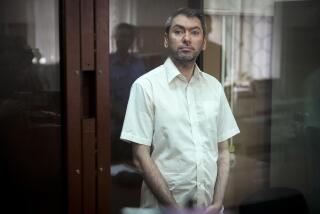A Man Who Would Not Be Silenced : Sakharov: He saw scientific, political and moral realities as one equation, and he died still warning about ‘tomorrow.’
- Share via
Andrei Dmitriyevich Sakharov appeared suddenly on the world stage in 1968 when his essay “Progress, Coexistence and Intellectual Freedom” was circulated privately in Russia and then published in the West. The combination of authorship and content were quickly recognized as astounding. Sakharov had played a key role in the development of the Soviet hydrogen bomb, and had become the youngest member of the Academy of Sciences in living memory. He was at the very pinnacle of the Soviet elite, with direct access to the general secretary. Later it was learned that within the government he opposed the enormous nuclear test explosions ordered in 1962 and advocated Soviet acceptance of the atmospheric test ban.
With his 1968 essay, Sakharov broke publicly with his past and milieu by taking a stance diametrically opposed to his government’s ideology and policy. His central point was original and heretical: The nuclear confrontation between the superpowers required the Soviet regime to respect the human rights of its citizens. He argued that peace and the existence of life itself could not be ensured in the nuclear age as long as there were totalitarian regimes. Only the democratization of the Soviet Union and some further acceptance of socialist principles by the West would guarantee mutual security.
The concept was controversial; it was even rejected by many Western physicists active in arms control who, in all other respects, were Sakharov’s loyal allies. Today it is obvious--even to the Kremlin--that Sakharov and his fellow dissidents
The movement for human rights and democracy led by Sakharov formulated all the ideas basic to the peaceful transformation of the Soviet totalitarian system into a modern democracy. More important, the movement prepared Russian society psychologically for this transformation.
After many years of what seemed almost hopeless struggle, the movement for human rights and democracy began to win. The crumbling of the monstrosity created by Lenin, Trotsky and Stalin had many causes, the most obvious of which was a loss of self-confidence by the Soviet leadership in its aims and methods. The moral victory was achieved by a peaceful resistance movement of thousands, nearly all of whom landed in prison or exile, including Sakharov himself.
Recently, the peaceful fight for human rights and democracy has scored remarkable advances in the Soviet Union. However, the forces of reaction and repression remain strong and the outcome is in doubt.
The creation of Solidarity in Poland and Charter ’77 in Czechoslovakia was partly inspired by the nonviolent movement of dissent led by Sakharov. Now millions of unarmed people across Eastern Europe have routed totalitarian regimes with vast powers of repression. Never before has a revolution of such profound geopolitical significance been unmarked by bloodshed.
Sakharov’s courage, honesty and selflessness are now common knowledge throughout the world. What is not as widely known is that he was one of the most original and versatile scientists of his age, who made great discoveries in cosmology, in the physics of elementary particles and in controlled thermonuclear fusion. He also had a deep understanding of the philosophical, legal and institutional foundations of successful democracies, which impelled him to warn against the concentration of power in the office now held by Mikhail S. Gorbachev, and to fight for fundamental revisions in the Soviet constitution. And his understanding of political strategy was remarkably shrewd for an idealist.
Sakharov possessed a rare combination of intellectual depth, moral conscience and tenacity. Long before the advent of perestroika, he said, “If a man does not keep silent, it does not mean that he hopes necessarily to achieve something. He may hope for nothing but nonetheless speak because he cannot, simply cannot, remain silent.” Sakharov lived by these words.
In the long, long line of dissidents who strove to free their motherland from czarist and communist tyranny, Sakharov has a place second to none. With ironic precision he identified the objective that his colleagues must pursue: “All power to the Soviets (parliaments); all land to the farmers; all factories to the workers.” This had been the Bolsheviks’ promise when they seized power in 1917, but what they delivered was dictatorship, terror, forced starvation and mass slaughter.
Sakharov’s goal was a free society and pluralistic democracy. He died preparing yet another assault on the formidable obstacles still to be overcome. As he went off to draft a statement for the next day’s session of the Congress of People’s Deputies, his very last words to his indomitable wife were, “Tomorrow there will be a battle.”
More to Read
Sign up for Essential California
The most important California stories and recommendations in your inbox every morning.
You may occasionally receive promotional content from the Los Angeles Times.













